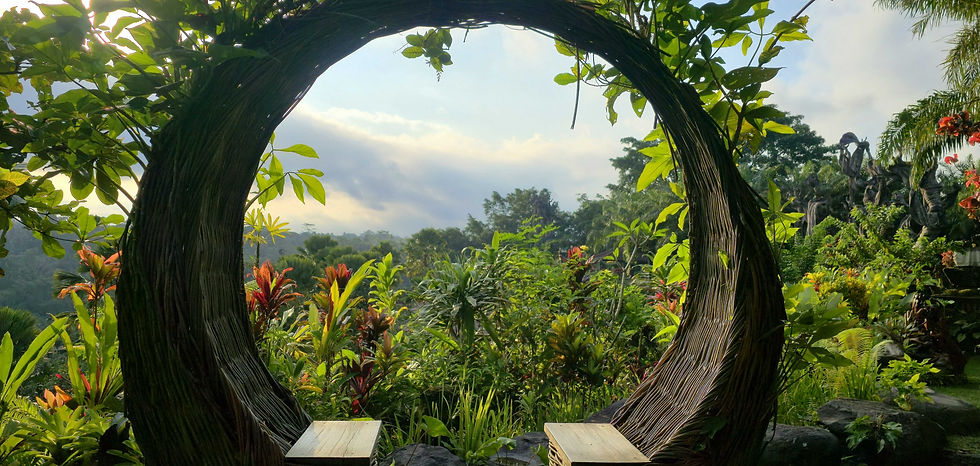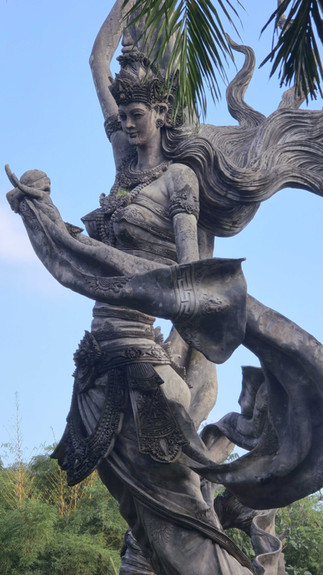Taman Dedari - Dine Among the Divine
- Shannon
- Aug 13, 2025
- 3 min read
Updated: Aug 14, 2025
Feasting in the Shadow of Angels
Meaning “Angel Park,” Taman Dedari draws its name and spirit from an ancient legend rooted in the spiritual journey of Rsi Markandeya, a revered sage said to have traveled from the sacred Dieng Plateau in Java to Bali around the 8th century. As part of his holy pilgrimage, Rsi Markandeya meditated along the banks of the Ayung River, where, according to oral tradition, he was granted a divine vision. In the stillness of his spiritual practice, he witnessed celestial female beings, known as Dedari, descending gracefully from the heavens to dance above the sacred waters. This mystical event not only sanctified the river and its surroundings but also gave rise to the name Kedewatan, meaning “place of the gods”, underscoring the area’s deep spiritual resonance.

Taman Dedari may take visual inspiration from sacred legend but at its core, it is primarily a restaurant, a commercial venue framed by myth. While the towering stone sculptures and tranquil riverside setting evoke a sense of spiritual grandeur, their purpose is largely to create an immersive dining experience. Though yoga, meditation sessions and cultural performances are offered, they serve to complement the atmosphere rather than define it. The park is less a temple to tradition and more a sculptural backdrop for leisure and hospitality, turning an ancient story into a curated, consumable setting.

The park’s statues are the heart of its storytelling. Approximately 50 hand carved stone sculptures of Dedari populate the landscape, designed to capture their otherworldly grace. These figures are intentionally depicted with feet never touching the ground, flowing hair in motion and traditional royal attire billowing in silent rhythm, suggesting both flight and ritual. The sense of movement is deliberate, reflecting the ephemeral presence of these spirits as they descend from realms unseen. Four of the Dedari statues tower over ten metres high, their forms both commanding and graceful. These monumental pieces are joined by mid-sized statues and smaller figures that cascade visually down to the riverbed, echoing the mythical descent from heaven to earth. This careful scaling draws the viewer into the legend, positioning them as witnesses to the same vision that Rsi Markandeya is said to have experienced. The overall layout subtly mimics a processional pathway from the divine to the human world.


The design process was deeply rooted in Balinese aesthetic principles and religious iconography. The sculptures were commissioned by the royal family of Puri Ubud and crafted by master sculptors using techniques passed down through generations. The resulting works avoid generic repetition and each statue bears individual expression and posture. This uniqueness reinforces the idea that the Dedari are not static ornaments but living embodiments of Bali’s cultural memory and myth.

By embodying an ancient vision in modern stone, Taman Dedari becomes more than an art installation, it serves as a spiritual invocation. The park’s layout, symbolism and craftsmanship are all dedicated to preserving a metaphysical encounter, ensuring the legend continues to inspire awe and reverence in new generations. In that sense, it is a place of memory and imagination, where stone becomes spirit and myth becomes tangible.

🗺️ Location
Kedewatan, Ubud, Gianyar Regency, Bali, Indonesia
🚆 How to get there
The entrance to Taman Dedari is at The Royal Pita Maha Hotel, roughly 7km's from the Ubud Palace. You could walk there in an hour and a half however I'd suggest taking a 15 minute Go-Gek or Grab scooter for about 50000 IDR. Getting transport back to Ubud proved to be a bit tricky, most riders don't seem to want to go this far. If possible, get a rider or driver to wait for you or wait near the lobby and grab a go-gek rider as they drop people off.
⭐ Attraction Info
The restaurant and park are open daily between 10am - 11pm and entry is free. Taman Dedari’s menu highlights Balinese flavours with a focus on local ingredients and traditional techniques. Guests can enjoy a mix of authentic and creative dishes, along with a selection of cocktails, wines, fresh drinks and amazing desserts to complete the experience, all at a pretty reasonable price. As this is quickly becoming a hot Insta spot, reservations would be recommended if you want to eat, via their website below. That said, most people come here for the photos and it was not busy during my visit in August 2025.
🔗Official Website
Thanks for reading about Taman Dedari - Dine Among the Divine. Check out more awesome destinations here!

Dine Among the Divine at Taman Dedari




























